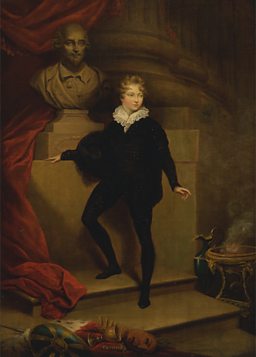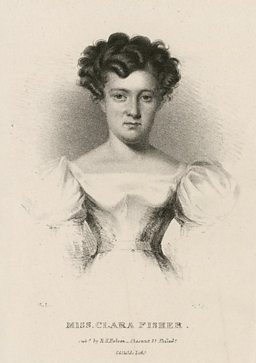Bettymania and the Children of the Bard
By Hannah Manktelow, University of Nottingham doctoral student working with the British Library
The nineteenth century saw a craze for juvenile Shakespeare performers. William Henry West Betty (1791 – 1874), commonly known as Master Betty, was one of the earliest and most successful child Shakespeareans.
-
![]()
Shakespeare Lives
The nation’s greatest performing arts institutions mark 400 years since the Bard's death
-
![]()
Shakespeare Festival 2016
The BBC celebrates the genius of the bard

He began his career in Belfast in 1803, and was engaged at London’s prestigious Covent Garden and Drury Lane theatres a year later. Amongst other roles, Betty played Romeo, Macbeth, Richard III and Hamlet, performing alongside an otherwise adult cast.

He undertook lengthy provincial tours, inspiring ‘Bettymania’ throughout the nation and making a considerable sum of money in the process. Betty’s success, however, was short-lived. By 1807 he was beginning to lose his boyish looks and Londoners quickly grew tired of his act. Though he pursued acting on and off for many more years, Betty was never able to recapture his past glories and eventually retired from the stage in 1824.
By 1807 he was beginning to lose his boyish looks and Londoners quickly grew tired of his act.
After Betty came numerous imitators, often pushed onto the stage by greedy parents looking to profit from their offspring’s talent for reciting Shakespeare. Child stars typically began acting aged six or seven, and were usually styled ‘Master’ or ‘Infant’ in order to highlight their youth. Shylock, Macbeth and Richard III were the most popular roles, and were played by boys and girls alike.

Clara Fisher (1811-1898)
Clara Fisher began performing at Covent Garden when she was six, and was renowned for her Shylock and Richard III. For ten years she starred in the West End and toured provincial theatres across the UK, often appearing alongside her older sisters, Amelia and Caroline. Their talent and stage presence captured the British public's imagination, and even inspired poems devoted to their talents. In 1827, when Clara was 16, the Fisher family moved to America where she graduated to Shakespeare's female characters, making her one of the only child stars to maintain fame as an adult.
Most of Fisher and Betty’s contemporaries worked for just a season or two before fading into obscurity. There are records of Master Grossmith preparing to retire from the stage aged 11; the Infant Kean (named after his supposed similarity to leading actor Edmund Kean) aged 12; and Master Mangeon, who travelled across the Atlantic in a bid to find fame in London, seeing his career end at the tender age of eight.
...the death knell for child stars was finally sounded with the introduction of the Prevention of Cruelty to and Better Protection of Children Act...
The interest in juvenile Shakespearean leads waned by the 1840s, but children continued to participate in the life of the theatre: Ellen Terry (1847-1928), one of the most celebrated actors of all time, played Puck in London’s Princess’s Theatre when she was only nine years old. In 1889 the death knell for child stars was finally sounded with the introduction of the Prevention of Cruelty to and Better Protection of Children Act, which banned children under seven from performing and required licenses for girls under 16 and boys under 14.
-
![]()
Who can we thank for Shakespeare's popularity?
The David Garrick Effect
-
![]()
Was Shakespeare a genius?
Where did the term 'bardolatry' come from?
-
![]()
The first lady of Shakespeare
Sarah Siddons helped legitimise the role of female performers
-
![]()
The actor who overcame prejudice to win over audiences
Ira Aldridge toured extensively during the 19th Century






